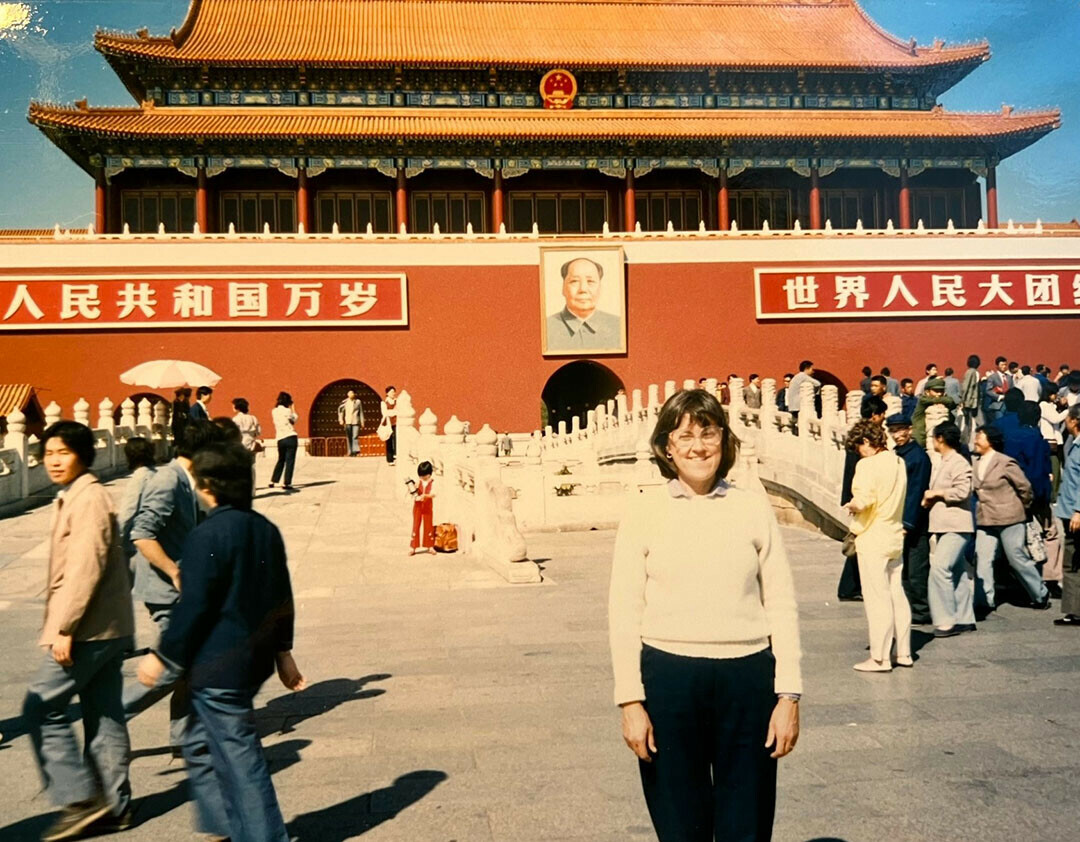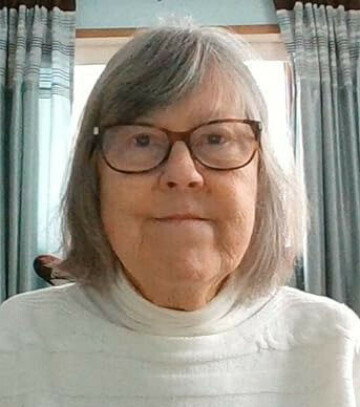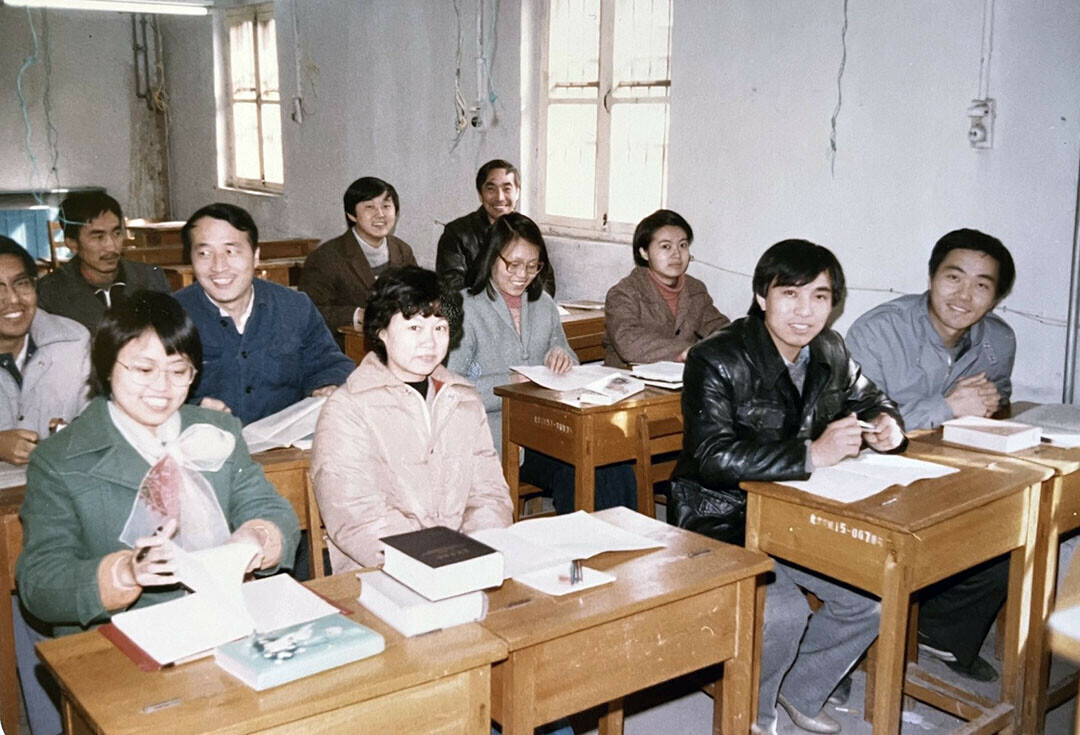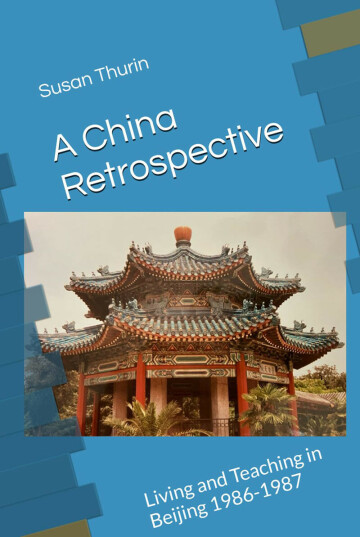New Book Looks Back on Life in China
former UW-Stout professor reflects on teaching in Beijing in the 1980s

The relationship between the United States and China is often called the most complex and consequential in the world, and a new book by a Menomonie author provides a ground-level examination of that relationship during a critical transition period – the 1980s.
Susan Thurin, at the time a professor of English at UW-Stout, spent the 1986-87 academic year as a “foreign expert” in China, teaching English to adults at the College of Light Industry in Beijing. She traveled extensively throughout China as well, and her reflections on the nation’s culture, history, and geography complement her experiences with students both inside and outside the classroom.
Her new book, A China Retrospective: Living and Teaching in Beijing 1986-1987, examines the contradictions in a country that both revered its ancient traditions and upended them through a Communist revolution. An American living in China was in a contradictory position as well, she writes: “On the personal level, is the paradoxical situation of the foreigner who is at once honored guest and suspicious outsider.”
In one memorable incident, Thurin shares the U.S. Bill of Rights with her students, who admire most of its sentiments (though they question the necessity of allowing freedom of religion and the right to bear arms). As she writes, “One student said, ‘I wish we had these rights.’ A couple of students looked a bit frightened at this discussion, as if they had just participated in some proscribed activity.”
”
I know what it means to live in a country where you’re afraid to say what you think because you never know the repercussions that it will have.

SUSAN THURIN
reflecting on her experience teaching and living in china
Thurin’s recollections of her adult student’s viewpoints – both on their own country and on the United States, at the time the land of Rambo and Reagan – are fascinating, as are her descriptions of everyday life in the Chinese capital and her travelog-style narratives of her trips throughout the vast nation.
There’s a good reason Thurin’s reflections seem fresh despite the passage of nearly four decades: She wrote the book not long after returning from her year in Beijing. However, she didn’t find a publisher at the time, and the manuscript sat in a box for decades. After selling Bookends on Main, the downtown Menomonie bookstore she owned from 2009 to 2022, Thurin rediscovered the manuscript. “I started looking at it and thinking, ‘I’m quite proud of it,’ ” she said.

While she supplemented the original text with a few 21st century comments, the book is largely a time capsule of a nation before the economic reforms and explosive growth that made it the world’s second largest economy. Thurin lived in China during a transitional era. Chairman Mao Zedong – who led Communists to victory and created the People’s Republic of China in 1949 – had died just a decade earlier, and the bloody and chaotic Cultural Revolution died with him. During the Cultural Revolution, traditional Chinese customs and traditions were repressed, schools and universities were shut down, and millions of young city dwellers were sent – largely against their will – to labor in the countryside. Many of Thurin’s students, by then young or middle-aged professionals, had been among those who had their lives turned upside down during that era. Now their country stood on the precipice of vast cultural, economic, and potentially political change. In 1989, just two years after Thurin’s time in Beijing, a large pro-democracy movement flourished in Beijing’s Tiananmen Square until it was violently suppressed by authorities, leaving hundreds dead.

In fact, a smaller student protest in January 1987, which led to some arrests, served as a prelude to the later pro-democracy movement as well as a dividing line in Thurin’s experience. Before that date, her students were more likely to offer criticisms of the government and to dismiss official pronouncements as propaganda; afterward, they were less candid. After all, the students – as well as their teacher – were under surveillance.
“I know what it means to live in a country where you’re afraid to say what you think because you never know the repercussions that it will have,” Thurin said. It’s an experience, she added, that she feels echoes of in the politically divided America of 2024.
In the intervening years, Thurin has stayed in touch with some of her long-ago students, several of whom have had successful careers in the United States. “I don’t think it impacted my teaching,” she said of her year in China, “but it certainly impacted my way of looking at the world.”
A China Retrospective by Susan Thurin is available online at Amazon.com. Thurin will speak about experiences living and teaching in Liberia, England, China, and Sweden at a session sponsored by Chippewa Valley Learning in Retirement from 1:30 to 3pm on Tuesday, Oct. 22, at the Rassbach Heritage Museum, 1820 John Russell Road, Menomonie. Learn more about signing up at cvlr.org.






















